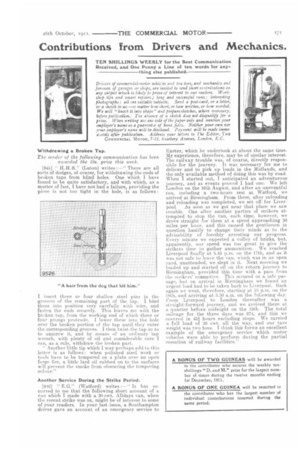Contributions from Drivers and Mechanics.
Page 21

If you've noticed an error in this article please click here to report it so we can fix it.
TEN SHILLINGS WEEKLY for the Best Communication Received, and One Penny a Line of ten words for any thing else published.
Drivers of commercial-motor vehic'es and trartors, and mechanics and foremen of garages or shops, are invited to send short contributions on any subject which is likely to prove of interest to our readers. Workshop tips and smart repairs ; long and successful runs ; interesting photographs : all are suitable subjects. Send a post-card, or a letter, or a sketch to us—no matter h,)w short, or how written, or how worded. We will "knock it into shape" and prepare sketches, where necessary, before publication. The absence of a sketch does not disqualify for a prize. When writing use one side of the paper only and mention your employer's name as a guarantee of bona fides. Neither your own nor your employer's name will be disclosed. Payment will be made immediately after publication. Address your letters to The Editor. THE COMMERCIAL MOTOR, 7-15, Rosebery Avenue, London, E.C.
Withdrawing a Broken Tap.
The sender of the following communication has Leen awarded the 10s. prize this week.
[945] " MILS." (Luton) writes :—" There are all sorts of dodges, of course, for withdrawing the ends of broken taps from blind holes. One which I have found to be quite satisfactory, and with which, as a matter of fact, I have not had a failurel providing the piece is not too tight in the hole, is as follows : I insert three or four shallow steel pins in the grooves of the remaining part of the tap. I bind these into position very carefully with wire, and fasten the ends securely. This leaves me with the broken tap, from the working end of which three or four prongs protrude. I lower these into the hole over the broken portion of the tap until they enter the corresponding grooves. I then twist the tap so as to unscrew it, and by means of an ordinary tap wrench, with plenty of oil and considerable care can, as a rule, withdraw the broken part. " Another little tip which I may perhaps add to this letter is as follows : when polished steel work or tools have to be tempered on a plate over an open forge fire, a. little lard oil rubbed on to the surfaces will prevent, the smoke from obscuring the tempering colour."
Another Service During the Strike Period.
[916] " E.G." (Watford) writes :—" It has occurred to me that the following short account of a run which I made with a 30-cwt. Alldays van, when the recent strike was on, might be of interest to some of your readers. In your last issue, a Southampton driver gave an account of an emergency service to Exeter, which he undertook at about the same time. My experience, therefore, may be of similar interest. The railway trouble was, of course, directly responsible for the journey. It was necessary for me to deliver and to pick up loads in the Midlands, and the only available method of doing this was by road. When I started out, I anticipated an adventurous journey, and as events proved I had one. We left London on the 16th August, and after an uneventful run, including a two-hours rest at Watford, we arrived at Birmingham. From there, after unloading and reloading was completed, we set off for Liverpool. As soon as we got near that place we saw trouble. One after another parties of strikers attempted to stop the van, each time, however, we drove straight: for them at a speed approaching 30 miles per hour, and this caused the gentlemen in question hastily to change their minds as to the advisability of forcibly arresting our progress. Every minute we expected a volley of bricks, but, apparently, our speed was too Feat to give the strikers time to gather ammunition. We reached Liverpool finally at 8.45 p.m. on the 17th, and as it was not safe to leave the van, which was in an open yard, unattended, we slept in it. Next morning we loaded up and started off on the return journey to Birmingham, provided this time with a pass from the strikers' committee. This secured us a safe passage, but on arrival in Birmingham we found an urgent load had to be taken back to Liverpool. Back again we went, therefore, starting at 10 p.m. on the 18th, and arriving at 5.30 a.m. on the following day. Prom Liverpool to London thereafter was a straight-forward journey, and we arrived there at a quarter before midnight on the 19th. The total mileage for the three days was 674, and this we covered in 43f hours excluding stops. We carried a full load of 30 cwt. all the way, and our tare weight. was two tons. I think this forms an excellent example of the emergency service which motor vehicles were able to perform during the partial cessation of railway facilities."






















